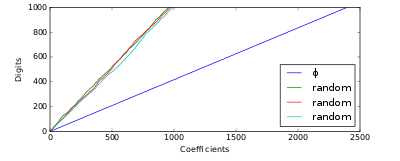Lochs' theorem
In number theory, Lochs' theorem is a theorem concerning the rate of convergence of the continued fraction expansion of a typical real number. A proof of the theorem was published by Gustav Lochs in 1964.[1]
The theorem states that for almost all real numbers in the interval (0,1), the number of terms m of the number's continued fraction expansion that are required to determine the first n places of the number's decimal expansion behaves asymptotically as follows:
As this limit is only slightly smaller than 1, this can be interpreted as saying that each additional term in the continued fraction representation of a "typical" real number increases the accuracy of the representation by approximately one decimal place. The decimal system is the last positional system for which each digit carries less information than one continued fraction quotient; going to base-11 (changing to in the equation) makes the above value exceed 1.
The reciprocal of this limit,
is twice the base-10 logarithm of Lévy's constant.

A prominent example of a number not exhibiting this behavior is the golden ratio—sometimes known as the "most irrational" number—whose continued fraction terms are all ones, the smallest possible in canonical form. On average it requires approximately 2.39 continued fraction terms per decimal digit.[3]
References
- ↑ Lochs, Gustav (1964), "Vergleich der Genauigkeit von Dezimalbruch und Kettenbruch", Abhandlungen aus dem Mathematischen Seminar der Universität Hamburg (in German), 27: 142–144, doi:10.1007/BF02993063, MR 0162753.
- ↑ Weisstein, Eric W. "Lochs' Theorem". MathWorld.
- ↑ Cooper, Harold. "Continued Fraction Streams". Retrieved 30 August 2016.